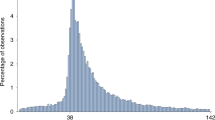Abstract
Demographic data from 848 Gabbra households are used to examine the relationships between herd size and reproductive success in relation to sex, in a traditional, pastoralist population. The number of camels in the household herd has a significant positive effect on the reproductive success of both men and women, although the effect of wealth is greater for men, as predicted from evolutionary theory. The greater the number of elder brothers a man has, the lower his reproductive success, as a result of a smaller initial herd and a later age at marriage. This is not true for women –number of elder sisters does not have a measurable effect on a woman’s fertility, although it does have a small, negative effect on the size of her dowry. These results are interpreted as competition between same-sex siblings for parental investment, in the form of their father’s herd, which is more intense between sons than daughters as parental investments are greatest in males.
Similar content being viewed by others
Author information
Authors and Affiliations
Additional information
Received: 30 June 1995/Accepted after revision: 23 October 1995
Rights and permissions
About this article
Cite this article
Mace, R. Biased parental investment and reproductive success in Gabbra pastoralists. Behav Ecol Sociobiol 38, 75–81 (1996). https://doi.org/10.1007/s002650050219
Issue Date:
DOI: https://doi.org/10.1007/s002650050219




